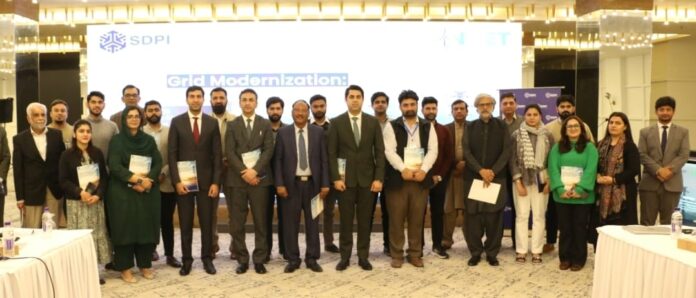- Advertisement -
ISLAMABAD, Feb 18 (APP):Experts at a policy dialogue stressed the need to take immediate measures for grid modernization by using Artificial Intelligence (AI) to integrate renewable energy (RE) into Pakistan’s national power infrastructure.
The dialogue on “Grid Modernization for RE Integration: Investment Opportunities for the Chinese Private Sector in Pakistan,” was organized by the Sustainable Development Policy Institute (SDPI) under the auspices of Green CPEC Alliance here, said a press release issued on Tuesday. Government officials, energy experts from Pakistan and China, representatives from financing institutions, civil society, and industry leaders participated in the dialogue.
Syed Faizan Ali, a member of the Prime Minister’s Solarization Committee, addressed the challenges posed by distributed energy resources (DERs). “Pakistan already has a surplus in solar capacity, but issues like reverse power flow during the day and a lack of quality inverters are hindering progress,” he said. He called for the implementation of smart meters, advanced distribution monitoring systems, and enhanced information and communication technology (ICT) in grid systems.
Mr Ali also emphasized the need for a comprehensive data strategy and software platforms to integrate network management, outage management, and consumer billing systems. “Regulatory barriers must be reduced to facilitate this transformation,” he added.
Muhammad Ayub, Chief Executive Officer of KPK Transmission and Grid Company, underscored the importance of planning and infrastructure development. “Pakistan aims to achieve 30% renewables target by 2030, but infrastructure constraints and a lack of reactive power compensation systems are major hurdles,” he said. Highlighting China’s collaboration in developing smart microgrids, he stressed the need for improved Public-Private Partnerships to attract more investors.
Arqam Ilyas, a member of Lahore Electric Supply Company (LESCO) said that smart meters and battery energy storage systems are critical for modernizing distribution systems. “Chinese companies can play a pivotal role in making these technologies financially viable,” he stated.
Engineer Ahad Nazir, Head of the Center for Private Sector Engagement at SDPI, highlighting the critical role of maintaining and upgrading grid infrastructure, said that Pakistan must learn from China’s advancements in artificial intelligence (AI) and predictive modeling to enhance grid efficiency and reliability. “The national grid’s lifecycle depends on modernization, and China’s expertise can be a game changer for Pakistan,” Nazir said.
Engineer Ubaid ur Rehman Zia, Head of the Energy Unit at SDPI, said the energy transition comes with significant costs, so it is essential for Pakistan to reduce its reliance on carbon-intensive energy sources. “Energy prices in Pakistan have been rising steadily, and renewable energy offers a sustainable solution. However, this requires new capital and technological investments,” he added.
Pakistan has already imported 16 gigawatts (GW) of solar photovoltaic (PV) systems, signaling rapid growth in the renewable sector, he said and stressed the need for identifying priority areas for private sector investments to modernize the grid effectively.
Muhammad Omar, a researcher at SDPI, highlighted the short- and long-term investment potential under the China-Pakistan Economic Corridor (CPEC). He identified Sindh and Balochistan as optimal regions for renewable energy projects, particularly solar and wind. “In terms of RE integration potential, he said, Sindh is leading in solar and wind variable renewable energy (VRE) integration, while Balochistan’s wind corridor has the potential to genera…

